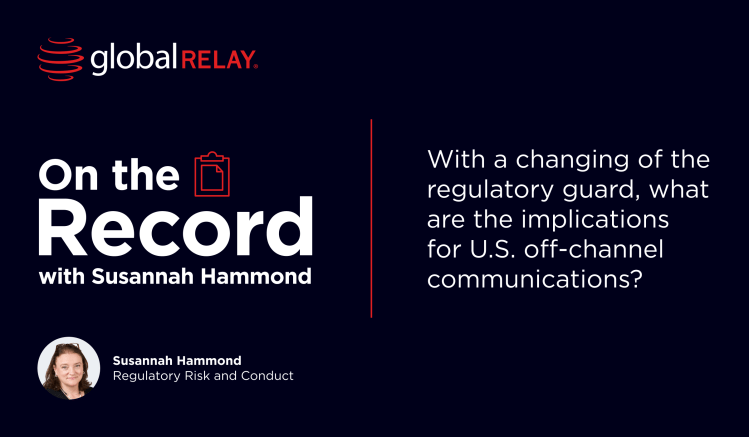As we approach the end of the year, it is both a time of looking ahead, and looking back. The Securities and Exchange Commission (SEC) has spent time doing both recently, setting out its enforcement priorities for the coming year and announcing its enforcement results for 2023.
Not only do the statistics paint a clear picture of the last year of regulation and the increasing tempo of enforcement action, they also give firms insight into potential enforcement trends for the next twelve months – affording them time to make some regulatory resolutions for the new year. While we’ve already summarized the enforcement results, we’ve taken a deeper dive into the trends represented below.
(Almost) record breaking
The results include some eye-catching statistics that prove the tempo of enforcement has been high throughout the year. The SEC announced that throughout FY23 it had:
- Filed 784 total enforcement actions, representing a 3% increase over fiscal year 2022
- The total included 501 “stand-alone” enforcement actions, which is an 8% increase over the previous fiscal year
- The regulator also filed 162 “follow-on” proceedings aiming to bar or suspend individuals
The value of the orders the SEC obtained through the fiscal year were for near-record breaking amounts:
- The SEC obtained orders for over $4.9 billion in financial remedies – the second highest amount in history after FY22
- The remedies comprised over $3.3 billion in disgorgement and prejudgement interest and over $1.5 billion in civil penalties – again, both the second highest amounts on record
- The regulator obtained orders barring 133 individuals from serving as officers and directors, the highest number of officer and director bars obtained in a decade
SEC fines in focus
The results announcement breaks down the areas that the SEC’s enforcement division has focused on throughout 2023, and gives examples of actions taken across each focus area. These include themes we have seen resurface many times throughout the last 12 months, such as recordkeeping, individual accountability, the Marketing Rule, and firms’ cooperation with regulators.
Recordkeeping
The SEC has focused on enforcement actions “addressing conduct that undermines oversight of the securities industry”, which include measures to enforce recordkeeping requirements. These enforcements are aimed at “targeting misconduct that undermined [the SEC’s] ability to effectively regulate the securities industry”, feeding into the broader “zero tolerance” attitude for hampering their ability to do their job effectively.
We’ve seen multiple instances of the SEC cracking down on recordkeeping lapses throughout the year, including enforcements against Citigroup for violating recordkeeping requirements in line with Section 17(a) of the Exchange Act and J. P. Morgan for the deletion of 47 million electronic communications, including emails and instant messages.
The SEC’s summary references other examples of recordkeeping enforcement, including their action against HSBC and Scotia Capital, where the violations stemmed from another key regulatory focus area – off-channel communications.
Since charging 16 Wall Street firms with combined penalties of over $1.1 billion for off-channel communications infractions in late 2022, illicit communications have been a particular area of focus for the SEC’s enforcement division. The industry has been adapting to this heightened level of regulatory scrutiny, with firms enacting communications compliance policies and enforcing them by terminating staff that refuse to comply with them, as seen when Goldman Sachs removed four executives, including Hari Moorthy, partner and Global Head of Transaction Banking, for violating its communications compliance policy.
With the current pace of enforcement for recordkeeping lapses and off-channel communications violations, alongside the SEC widening electronic recordkeeping requirements with Rule 18a-6, it is a safe bet that this enforcement focus will continue into the new year.
Individual Accountability
The annual summary states that “individual accountability remains a pillar of the SEC’s enforcement program”, which is backed up by the enforcement statistics:
“In fiscal year 2023, approximately two-thirds of the SEC’s cases involved charges against one or more individuals.”
There has been a growing trend towards individual accountability and personal liability, with individuals subject to fines and censure for infractions alongside the firms they represent. Although not SEC enforcements, the Financial Industry Regulatory Authority’s (FINRA) actions against securities representatives, which included a $40,000 individual fine, illustrate the ongoing regulatory mission to hold individuals accountable for non-compliance. With the SEC also obtaining “133 orders barring individuals from serving as offices and directors of public companies, the highest number in a decade”, SEC chair Gary Gensler’s previous statement that “nothing motivates quite like accountability” should continue to stand as a clear warning.
Marketing Rule
Although it only recently came into force in November 2022, the SEC’s Marketing Rule has already made regulatory waves, with the regulator having imposed over $850,000 of related fines. The enforcement summary details that these firms violated the rule:
“The SEC’s orders find that each of the charged firms advertised hypothetical performance to mass audiences on their websites without having the required policies and procedures.”
With the Marketing Rule being highlighted as a 2024 examination priority, firms will need to ensure their marketing teams are aware of the potential risks errant campaigns and adverts can cause and take the necessary measures to mitigate them.
Cooperation
While the summary contains many examples of where the enforcement arm of the SEC has shown its teeth, including fines, censures, and disbarment, it also highlights the regulator’s stance on firms’ cooperation with investigations, and how this cooperation can mitigate more serious outcomes:
“In fiscal year 2023, the SEC consistently rewarded meaningful cooperation to efficiently promote compliance across the securities industry. Rewarding parties that cooperate encourages other firms to proactively self-police, self-report, and … provide meaningful cooperation with the Division’s investigations.”
The SEC includes several examples of where firms coming forward has resulted in a degree of clemency, including instances where companies self-reported and undertook affirmative remedial measures, and received comparatively smaller penalties than firms that had not self-reported as a result. In this last case, Gurbir S. Grewal, Director of the SEC’s Division of Enforcement, highlighted that there are “real benefits to self-reporting, remediating, and cooperating”. These echo previous sentiments from Grewal:
“Self-report, cooperate and remediate. If you adopt that playbook, you’ll have a better outcome than if you wait for us to come calling.”
Your friendly neighbourhood SEC enforcers
In a quote summarizing the enforcement results, Gary Gensler, SEC Chair, said:
“The investing public benefits from the Division of Enforcement’s work as a cop on the beat.”
This image of a cop on the beat – steady, reliable, and involved at street and community levels – is certainly evocative, and speaks to the Division of Enforcement’s role in policing bad actors on behalf of the investing public in an effort to keep markets ‘clean’. It also supports the goal of maintaining a principal element that Gurbir S. Grewal highlights in his own summary – trust:
“Investor protection and enhancing public trust in our markets requires that we work with a sense of urgency, using all the tools in our toolkit. As today’s results make clear, that’s precisely what the Enforcement Division did in fiscal year 2023 … stood up for the investing public. I am extremely proud of the Division’s efforts … all of which help protect investors, hold bad actors accountable, and promote public trust.”
While the SEC focuses on preserving the trust of the investing public, firms can trust that the Division of Enforcement won’t slow down while pounding the beat through the year ahead. Between the trends suggested by these enforcement results, the SEC’s disclosure of its enforcement priorities for 2024, and Grewal’s speech laying out the trigger warnings for when the SEC will take actions against CCOs, firms can consider themselves forewarned and forearmed to navigate the regulatory requirements of 2024 and stay off the regulator’s most wanted list.




